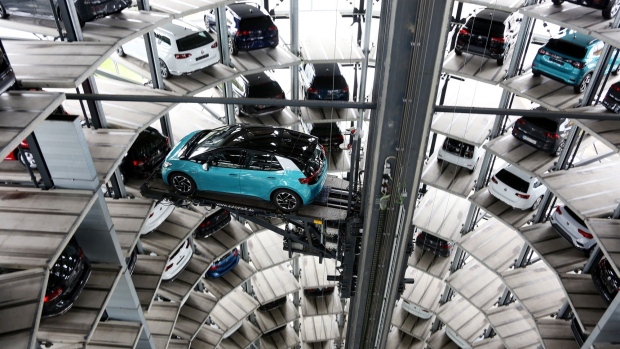Mar 16, 2021
VW surges 29% after laying plans to dethrone Tesla by mid-decade
, Bloomberg News

Volkswagen AG shares surged the most since a historic short squeeze a dozen years ago after back-to-back briefings on how it plans to supplant Tesla Inc. as the global electric vehicle leader.
VW’s common stock soared as much as 29 per cent on Tuesday after it announced plans to standardize key technologies across its sprawling industrial empire and generate scale effects that both Tesla and established automakers are unlikely to match. On Monday, the company said it would build six battery factories in Europe alone.
The share move is reminiscent of the short squeeze that briefly made VW the world’s most valuable company in 2008. VW’s three dominant shareholders - the Porsche and Piech family, the state of Lower Saxony and Qatar -- own 90 per cent of the common shares outstanding. VW’s preference stock, its more widely traded security, was up just 5.7 per cent as of 1:45 p.m. in Frankfurt.
VW is targeting 1 million electric-vehicle sales this year and aims to become the global EV market leader by 2025 at the latest, the company said. By 2030, the share of fully electric vehicles in Europe is set to rise to as much as 60 per cent of its deliveries.
“We will accelerate our transformation journey in 2021 and beyond,” Chief Executive Officer Herbert Diess told reporters. The newly-formed management board “is set to unleash value,” he said.
Europe’s largest automaker is overhauling its sprawling operations to free up funds for new technologies as it plans to build the industry’s largest fleet of electric vehicles. The company is introducing several new battery-powered models, has unveiled Europe’s boldest battery-production push and struck a deal with unions to cut more jobs in Germany.
VW said it will use a “platform” approach to leverage economies of scale across its stable of 12 automotive brands and raise the efficiency of deploying technologies including software, batteries and charging infrastructure.
The company plans to bolster its software operations to 10,000 staff as it develops automated-driving features and in-car operating systems. The hiring push would make VW one of Europe’s largest software firms behind SAP SE, improving its chances of catching up to Tesla and counter the risks posed by the automotive ambitions of Apple Inc. and Alphabet Inc.
Here’s how VW’s units performed last year:
- Operating profit at VW’s namesake passenger-car brand plummeted to 454 million euros in 2020, from 3.8 billion euros in 2019
- The Audi division, which leads the group’s software expansion, saw operating profit decline to 2.7 billion euros from 4.5 billion euros
- Porsche, the group’s most profitable brand, emerged from the pandemic largely unscathed with 4 billion euros in operating profit, compared with 4.2 billion euros in the previous year
Last month, the company said it expects profitability to improve this year. It kept its dividend proposal unchanged even as analysts braced for a cut, and said rising vehicle deliveries will push up revenue up significantly. By 2025 at the latest, VW wants to generate an operating return on sales of 7 per cent to 8 per cent.





